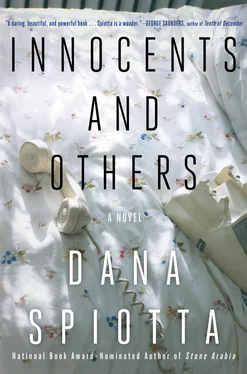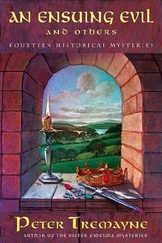Dana Spiotta - Innocents and Others
Здесь есть возможность читать онлайн «Dana Spiotta - Innocents and Others» весь текст электронной книги совершенно бесплатно (целиком полную версию без сокращений). В некоторых случаях можно слушать аудио, скачать через торрент в формате fb2 и присутствует краткое содержание. Год выпуска: 2016, Издательство: Scribner, Жанр: Современная проза, на английском языке. Описание произведения, (предисловие) а так же отзывы посетителей доступны на портале библиотеки ЛибКат.
- Название:Innocents and Others
- Автор:
- Издательство:Scribner
- Жанр:
- Год:2016
- ISBN:нет данных
- Рейтинг книги:5 / 5. Голосов: 1
-
Избранное:Добавить в избранное
- Отзывы:
-
Ваша оценка:
- 100
- 1
- 2
- 3
- 4
- 5
Innocents and Others: краткое содержание, описание и аннотация
Предлагаем к чтению аннотацию, описание, краткое содержание или предисловие (зависит от того, что написал сам автор книги «Innocents and Others»). Если вы не нашли необходимую информацию о книге — напишите в комментариях, мы постараемся отыскать её.
Innocents and Others — читать онлайн бесплатно полную книгу (весь текст) целиком
Ниже представлен текст книги, разбитый по страницам. Система сохранения места последней прочитанной страницы, позволяет с удобством читать онлайн бесплатно книгу «Innocents and Others», без необходимости каждый раз заново искать на чём Вы остановились. Поставьте закладку, и сможете в любой момент перейти на страницу, на которой закончили чтение.
Интервал:
Закладка:
“And then I go— Wait, are you filming me?” Deke said.
“Yeah,” Meadow said.
“How do I look?” he asked.
“As you no doubt know, no face was ever better built for a viewfinder than yours,” she said, and Deke laughed.
“So I go, are you going to pierce it? And he goes, it only hurts for a second, but there will be a lot of blood—”
Deke moved his face a lot when he spoke, eyebrows furrowed, lips twisted. His drunkenness was making him silly, and with his large eyes he looked like an animated creature, a cartoon. Not the beauty she expected. She put her camera down.
“Why did you stop?” he said, looking at her, the animation now toward a frown.
Meadow held up another pack of film.
“Oh lord,” he said.
“And no sound,” she said.
“This will never do,” he said, his eyes rolling and his voice in some theatrical zone between joking and serious. He was imitating someone without knowing it. An imitation of some fake gay man in a bad movie. So an imitation of an imitation. Meadow loaded the camera and aimed it at him and when she began to film, he got back into telling his story. He had waited for her camera. The fakey theatrical element was still there, but it almost always is when you shoot someone in three-minute segments. It isn’t long enough to shake off the fake, but it is long enough to do something to the person being filmed. Depending on the person, of course.
In high school when Meadow got her first real movie camera, she wanted to make films like Andy Warhol’s screen tests. She set up a tripod in front of a sheet in her garage. She lit it with three stark, hard lights so there were no shadows to hide in. Unlike Warhol’s, her tests would have color and sound. Still only fifty feet of film, or three minutes. It was a kid’s project, simple and derivative. Film various people doing nothing. Use the same background and precise setup each time. The person on a stool, the camera four feet away on a tripod. The exact same harsh lighting. Then press record and film them for three minutes. Meadow thought her big variation on Warhol — aside from the addition of sound and color — was that she wouldn’t slow the film down to four minutes the way Warhol did. She would show her faces in real time. It seemed a little like cheating to her to slow the film down, as if the audience must endure something the subject and the filmmaker did not. She wanted to experience time, and the discomfort of that duration would be the same for everyone. Three minutes felt long indeed, and she imagined that some people would get very uncomfortable. Being filmed doing nothing required composure that not everyone had. Which is why she was interested in the first place.
Meadow knew what it felt like because she filmed herself first. She stared into the lens of the camera and did not move. She resisted the urge to entertain the camera, to do something. She would be a statue, like Gerard Malanga’s Warhol screen test, not a collection of twitchy fake emoting like Dennis Hopper’s screen test. She refused.
She knew her screen test concept was a little too obvious, even for a high school kid, but it didn’t go as she had expected in a number of ways.
First she filmed Carrie. Carrie smiled and talked to her the whole time (Is it on? Should I look into the camera? It’s funny, when I was a little kid I used to hate it when my mom would make a movie of me. Whatever I was doing I would stop as soon as I saw the camera…) . Meadow did not respond but watched her closely, arms crossed, face neutral. It wasn’t a dialogue. This didn’t faze Carrie. Right away she relaxed into stories of her mother sneaking up on her. (I could feel the camera on me like a rash. I just knew I was being filmed…)
“Okay, that’s it. Film is done,” Meadow said.
“Three minutes up already?” Carrie said. “I can go longer if you want.”
“Fuck you,” Meadow said. Carrie laughed.
But other people were not as comfortable as Carrie or as stubborn as Meadow. Meadow’s mother, for instance, sat with a rigid smile on her face. Impossible to sustain, it melted away and she grew older in seconds. Her father fidgeted and did not hide his irritation (this stool is uncomfortable, you know) . But he tried to be a good sport and gamely stuck it out.
Meadow asked a few friends from school to do it, and to her surprise everyone she asked said yes. Many of the girls moved their heads as if they were in front of a mirror. The three-quarter turn of the face and the look back. The slide of hair in front of the eyes. It was a photo shoot, and they had practiced for the gaze of a camera since they were eight. Some of the boys she asked were the same way: actory, striking various poses. One sang a song a cappella. Then it started to happen. Kids she didn’t even know asked to be filmed. Everyone wanted a screen test. She shot two a day after school for weeks. She thought the volunteers were self-selected extroverts, so she sought out kids beyond the film and drama people: the punk rock kids, the skateboarders, the math nerds. Everyone said yes. Even one of the basketball players told her he wanted to be filmed.
She also noticed that although many people readily agreed to be filmed or volunteered themselves, some of the subjects didn’t enjoy the actual filming as much as they expected. A number of them started out playing up to the camera and then appeared a little bored as they waited out the clock. They didn’t seem to experience the filming as something challenging the way Meadow did. It was more of a nuisance. A very small group hated it, and of these, one became very upset by the filming. Lisa Helprin had bad skin, but she was still fairly pretty. Her long hair fell in her face, and she kept playing with it as Meadow filmed. She looked down, and then she looked up at the camera with a wince. She looked at Meadow, but Meadow was behind the camera staring back, unmoving. Lisa’s eyes darted down again and then back up at Meadow. Lisa started to bite her lip. Her eye twitched. What was she thinking about? One minute was up, and Lisa looked a little sweaty. She breathed out loudly, almost a sigh, and put her hand on her head as she heavily breathed in.
Lisa looked up again, now a little annoyed, almost angry. Meadow stared back. Lisa mesmerized her; Meadow could watch her all day. Then Meadow saw Lisa’s eyes redden and start to tear up. She finally jumped up and ran out of the frame.
“Sorry,” she shouted as she stumbled out the door, but Meadow didn’t look up from the stool where Lisa had sat. Then the roll ran out. Three minutes. Lisa Helprin’s would be the best screen test by far.
Two other subjects also walked off before the three minutes were up. Some others stayed but looked deeply uncomfortable for the last minute. Uneasy, nervous laughs. One person turned his back to the camera. He was so hostile that she half-expected him to smash the camera to the ground like Frank Sinatra. Meadow began to feel that her camera was a magic machine that made people reveal themselves whether they liked it or not. Some people could resist and control it, while others quickly unraveled. She suspected that if she had longer than three minutes, and if the subjects didn’t know how long the shoot would last, she could undo anyone.
After she had thirty-two screen tests, she spliced them together in four twenty-four-minute reels, eight screen tests per reel. Then she showed them in one of the mini-auditoriums at school for her eleventh-grade end-of-the-year project. It never occurred to Meadow that anyone who agreed to be filmed would feel any differently after the experience of being filmed, even the people who left. Everyone who came to the screening claimed to love it, but many people left after the first reel was done. Many more left after the second. And by the last reel, the audience that remained were mostly teachers and some of the subjects who were still waiting to see their screen tests. In the end, Meadow thought it was more interesting to make than to watch. And she decided her whole senior project would investigate the subject of watching the screen. What makes something compelling to her? If it is only narrative, then repetition should make it boring, right? Once the narrative is known, it has to grow less interesting. So slowly she came up with her own test. She had the idea of watching her favorite film over and over, night and day. She knew that Godard learned about film by watching Bresson’s Pickpocket ten times in a row, over and over. And Orson Welles learned everything by watching John Ford’s Stagecoach twenty times in a row. She needed to do something like that, for she was convinced that endurance tests revealed that there is no such thing as “familiar.” The longer you looked at a person or a thing you knew, the stranger it became. Now Meadow saw a chance for another kind of endurance test.
Читать дальшеИнтервал:
Закладка:
Похожие книги на «Innocents and Others»
Представляем Вашему вниманию похожие книги на «Innocents and Others» списком для выбора. Мы отобрали схожую по названию и смыслу литературу в надежде предоставить читателям больше вариантов отыскать новые, интересные, ещё непрочитанные произведения.
Обсуждение, отзывы о книге «Innocents and Others» и просто собственные мнения читателей. Оставьте ваши комментарии, напишите, что Вы думаете о произведении, его смысле или главных героях. Укажите что конкретно понравилось, а что нет, и почему Вы так считаете.












